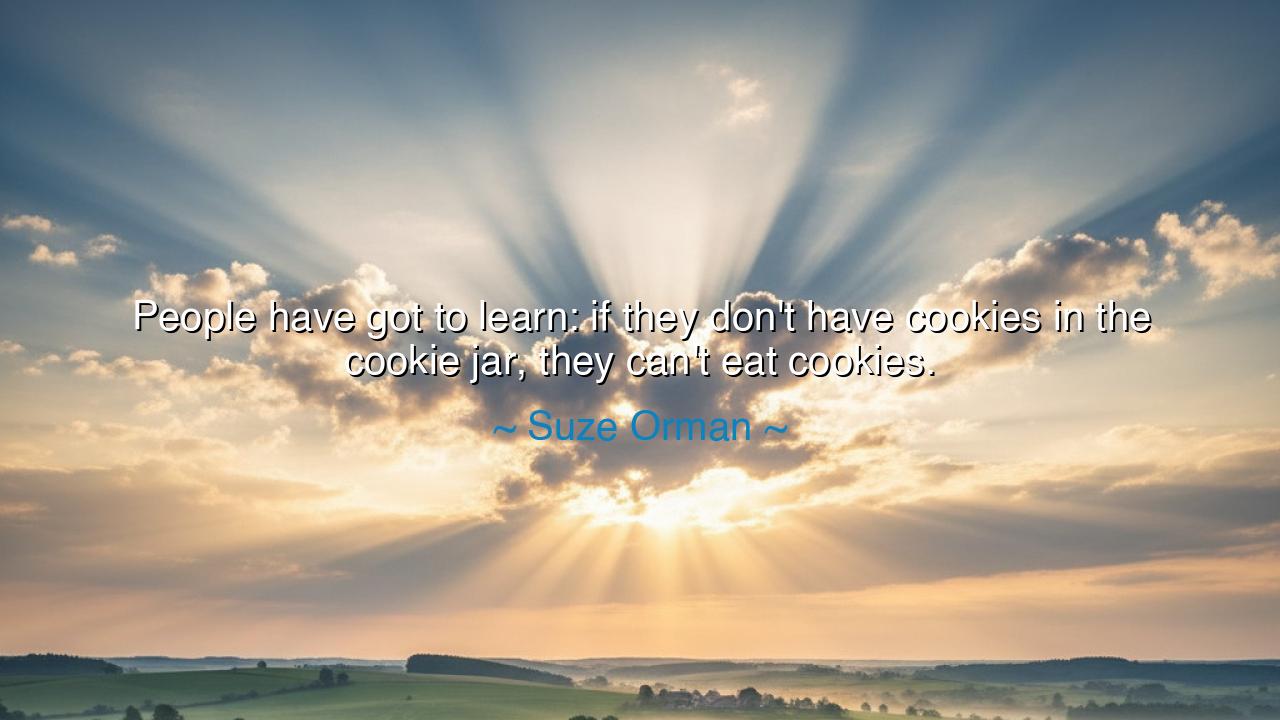
People have got to learn: if they don't have cookies in the
People have got to learn: if they don't have cookies in the cookie jar, they can't eat cookies.






“People have got to learn: if they don’t have cookies in the cookie jar, they can’t eat cookies.”
So declared Suze Orman, the sage of modern finance, whose wisdom speaks not only of money, but of life’s eternal law — that one cannot take what one has not first earned, nor spend what one has not first saved. Beneath the sweetness of her metaphor lies a truth as old as civilization itself: that discipline precedes reward, and that abundance without foresight leads always to emptiness. Her words, though spoken in the language of household simplicity, echo the voices of philosophers and prophets who have warned for centuries — what you consume must first be created.
The cookie jar, in Orman’s saying, is the vessel of one’s labor, the storehouse of effort and prudence. It is the symbol of preparation, of patience, of wisdom in stewardship. The cookies, then, are the pleasures of life — the comforts, the luxuries, the indulgences. Her message is clear: to take from the jar, there must first be something placed within it. The one who reaches for sweetness before he has worked for it finds only emptiness, and emptiness breeds despair. Thus, Orman’s counsel is not merely about wealth, but about balance, self-control, and respect for the laws of cause and effect that govern all creation.
In the days of old, the same lesson was taught in sterner words. The farmer who sowed no seed reaped no harvest; the sailor who refused to mend his sails perished in the storm. The wise of every age have known that the fruit of comfort grows only upon the tree of diligence. Consider the story of Joseph in Egypt, who, guided by divine foresight, stored grain in the years of plenty to survive the years of famine. When the drought came and the earth turned barren, his people did not starve, for they had filled their “cookie jars” with care. His wisdom saved a nation. So too must we learn to save, to plan, to build — not out of fear, but out of reverence for the cycles of life.
Suze Orman speaks in a time when many have forgotten this sacred rhythm. The modern world teaches to consume without creating, to borrow without restraint, to live as though tomorrow’s sun is owed. Yet the cookie jar of such a person remains hollow. For joy taken without effort sours into regret; wealth borrowed without earning becomes a chain. Orman’s words are a gentle but firm awakening — a call to remember that security is not born of luck, but of wisdom, that plenty is not magic, but mastery.
But beyond money, her wisdom reaches deeper still. The cookie jar may also symbolize the reservoir of the soul — the well of love, strength, and integrity from which we draw in times of need. One cannot give kindness if one has not cultivated it; cannot offer patience if one has never practiced it; cannot sustain others if one’s own spirit is barren. To expect sweetness from life without first contributing sweetness to it is folly. Thus, in every realm — spiritual, emotional, material — Orman’s truth endures: you cannot eat from an empty jar.
Her words, though clothed in the language of humor, carry the gravity of moral law. They teach us the beauty of self-reliance, the nobility of preparation, and the quiet power of restraint. They remind us that satisfaction born of patience is richer than pleasure seized in haste, and that the truest wealth is not measured by the size of the jar, but by the wisdom of the one who fills it.
So, let this teaching be your guide:
-
Save before you spend, for foresight is the mother of freedom.
-
Create before you consume, for value arises from labor.
-
Give to your future self, that you may never hunger when the world grows lean.
-
Fill your jar with purpose, not with waste — for every crumb counts in the feast of tomorrow.
Thus spoke Suze Orman, in the spirit of the ancients though born of the modern age — a teacher reminding her people that prosperity is not found in chance, but in choice. Her “cookie jar” is the emblem of wisdom itself: a vessel to be filled with diligence, guarded with care, and opened only with gratitude. For the one who learns this truth will never fear famine, and the one who forgets it will always hunger, even in a world of plenty.






AAdministratorAdministrator
Welcome, honored guests. Please leave a comment, we will respond soon